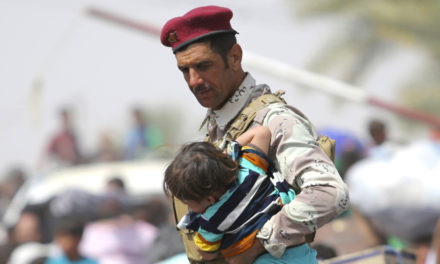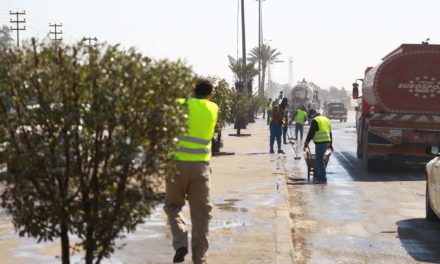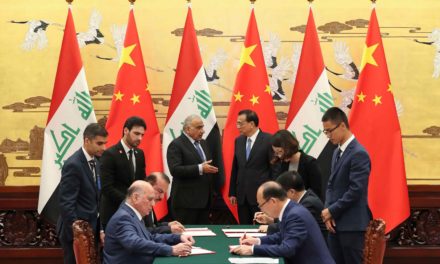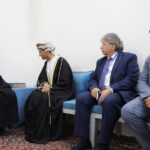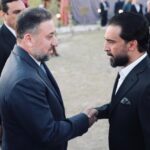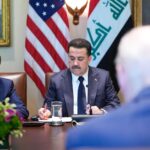(Masoud Barzani in his headquarters. Photo: European Commission DG ECHO/Flickr)
Although Masoud Barzani holds no official executive position in Iraq, he still plays a leading role in Kurdish-Iraqi politics. It has become a norm that in addition to the president and the prime ministers of the Kurdistan Region of Iraq (KRI) represented by Nechirvan and Masrour Barzani respectively, visiting foreign delegations to the Kurdistan Region will meet with Masoud Barzani, despite not adhering to diplomatic protocol. In fact, following the two elections last year, no foreign leaders have visited the Kurdistan Region without meeting with Masoud Barzani at his so-called ‘Barzani Headquarters’, which has become, since its establishment, a symbol for Masoud’s never-ending hunger for power.
When the Kurdistan Region referendum for independence in 2017 backfired, Iraqi, regional and international pressure – especially from the United States – forced Masoud Barzani to leave the presidency which he had held since its establishment in 2005. However, very few expected him to reemerge as the most influential leader in the KRI after that. The Kurdistan Democratic Party, the party that he heads since the death of his father in 1979, won two controversial elections in 2018; first, as the leading Kurdish party in the national elections on 12 May 2018 and then on 30 September 2018 during Kurdistan parliamentary elections. This helped the KDP cement its monopoly over KRI’s state institutions.
Today, five major institutions in the KRI, represented by the Presidency, Premiership, Kurdistan Region Security Council (KRSC), and the Kurdistan Counter Terrorism Force (KCTF), are all headed by members of the Barzani family (the presidency by Masoud’s nephew, and the rest by his sons). Even though the Kurdistan Parliament is headed by PUK’s Rewaz Fayaq, the deputy and secretary are KDP members. The Kurdistan Judiciary Council is also controlled by the KDP. Likewise, the KDP controls the Foreign Affairs Department, the Natural Resources Ministry and the Interior Ministry, in addition to major posts in Baghdad’s central government.
This however was not enough for Masoud Barzani. Despite the fact that he is no longer president, Masoud went so far as to refuse leaving his former office and residence based in the presidential palace after his son-in-law and nephew Nechirvan Barzani assumed the presidency of the KRI. The latter was forced to work from his personal office in Erbil.
The palace, based in Sari Rash, Pirmam was a public tourist attraction before 1991 but Masoud Barzani has occupied it since his return to the KRI following the Kurdish uprising during the spring of 1991. Today, other than Barzani’s family, no one is allowed to visit or live there and Masoud is using the palace as his personal headquarters. Interestingly, even the chairs and design of the presidential palace have not been changed since he renamed it the ‘Barzani Headquarters’.
In August 2018, the mouthpiece of the Kurdistan Democratic Party (KDP) published an editorial claiming, “the reestablishment of the Barzani Headquarters as an umbrella to recreate the good will and respect of the Kurdistan people.” The editorial detailed what would be the Barzani headquarters which was paraphrased in a sentence: “Therefore, the Barzani Headquarters is not merely a political headquarter to bring together the political parties, it is rather an umbrella to regain the dignity of all the individuals, groups, the nation, the religions and the tribes that might be persecuted by the other, it is even an umbrella to the individual whose rights might be persecuted in the process of implementation rule of law. Therefore, the meaning and symbol of the Barzani Headquarters surpasses the borders of politics and they will include all aspects of society and their aims is providing political stability and social peace.” The editorial adds that the Headquarters is, “a spiritual decision of a living conscience,” and that “for resolve all the issues in the Kurdistan Region in various sectors, including the issues among the political parties, there is a need of a good will in the living conscience of Masoud Barzani who decided reestablishing the Barzani Headquarters in the Kurdistan Region.”
After his resignation from the presidency, the KDP began a campaign to elevate Masoud Barzani’s status to ‘the Marja’ of all Kurdish people, similar to the spiritual leadership of the Shia in Najaf. This aims to make his Barzani Headquarters not only central to Kurdish politics in Iraq, but also instrumental in expanding his hegemony over other Kurdish areas, especially in Syria. Today, KDP’s social media pages and accounts call Barzani, ‘the Marja of about 50 million Kurds.’
However, Masoud Barzani is neither a spiritual nor religious leader, this despite the fact that his uncle Sheikh Ahmed Barzani was the Khudan (a kind of spiritual leader) of the Barzani tribe, who was respected among the Barzanis and neighboring tribes for promoting equality, respecting minorities, Kurdish nationalism, and environmental protection. Compared to his uncle, Masoud Barzani has created more enemies and rivals than friends among the Kurdish people and the Kurdish tribes.
KDP’s attempts to portray Masoud Barzani as the top figure of the Kurdish cause has been obstructed by the Kurdistan Workers’ Party (PKK) which is the largest Kurdish political party and with a strong ideology that expands to all the parts of Kurdistan, as well as Kurdish diaspora. Meanwhile, Abdullah Ocalan remains the most influential Kurdish figure as the Kurds in Turkey and Syria unquestionably consider him as their leader.
Other than the KDP itself, a few minority leaders in the KRI, and a small group of minor Kurdish parties in Syria, Iran and Turkey with no considerable influence on the ground, nobody considers Barzani as the leader of the Kurds. The major political Kurdish factions like the Islamists, PUK, Gorran and the New Generation Movement, which hold seats at the Kurdistan and Iraqi Parliaments consider Barzani merely the leader of the KDP. Sa’di Ahmad Pira, a member of the Patriotic Union of Kurdistan (PUK) Political Bureau, urged the KDP that, “it is not acceptable that the KDP intends to make Masoud Barzani the Marja of Kurdistan.”
Barzani’s attempts to portray himself as the Marja of the Kurds is in line with what the KDP is doing for years now, turning the Kurdistan Region into a de-facto monarchy after the KDP has already become a family party. To his advantage, the war on ISIS helped Barzani become internationally known, and the passing away of his historical and main political and ideological rivals, namely former Iraqi President Jalal Talabani and Gorran Leader Nawshirwan Mustafa in 2016 and 2017 respectively, helped Masoud Barzani promote himself as the Kurd’s de-facto Marja.
A next step in Masoud Barzani’s plan to consolidate power is the formation of a political council where all the Kurdish political parties in the Kurdistan Region are represented to further garner legitimacy for his dream to cement his unquestionable ‘Kurdish Marja’ status. Nonetheless, for Barzani to be a Kurdish national leader who will be accepted and respected by all, he must put the Kurdish people’s interests ahead of his family and party interests. He must reconcile with all the Kurdish political parties, promote democracy, human rights, social and economic justice, women’s rights, transparency and anti-corruption measures. Very importantly, he should reconcile with the Yazidis who were abandoned by the KDP when ISIS attacked them.
Barzani’s hunger for power jeopardizes the Kurdistan Region’s constitutional institutions, and further undermines the dreams for establishing a democracy in the region. His unrestricted power, despite holding no official position within the regional government, is in fact a coup over the democratic constitutional institutions in the KRI and Iraq.

Kamal Chomani
Kamal Chomani is a Nonresident Fellow at the Tahrir Institute for Middle East Policy.


